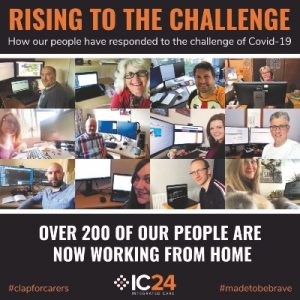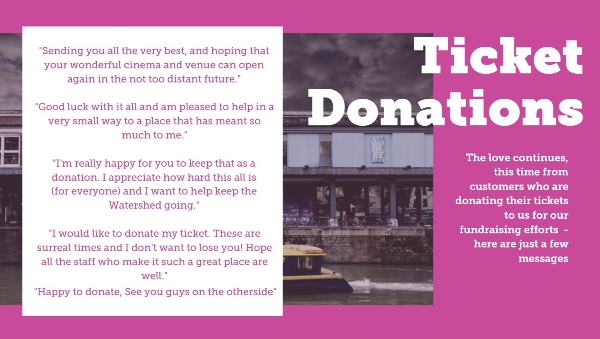How social enterprises are adapting to the crisis
See examples of how social enterprises are adapting their business in response to the crisis
In the face of adversity and rapidly changing circumstances, many social enterprises have been demonstrating their flexibility in their response to the current crisis. Like all businesses, they are facing a fight for survival, but many have really stepped up to the challenge, by scaling up or adapting their offer to fit the changing environment.
Social enterprises provide the ‘glue’ that holds society together, often where the traditional market and public sector doesn’t provide. Research also shows that social enterprises outperform the private sector in terms of innovation. Below we share just a handful of examples of how these businesses are adapting their services, to continue providing much-needed support to communities.
Please get in touch if you would like to share how your social enterprise is adapting to the current crisis.
3 Spirit UK
 3 Spirit UK is a social enterprise specialising in training and consultancy services for the health and social care sector. They work to raise the profile of the social care workforce, which is often undervalued.
3 Spirit UK is a social enterprise specialising in training and consultancy services for the health and social care sector. They work to raise the profile of the social care workforce, which is often undervalued.
They deliver over 300 different courses to a range of services settings, through which they aim to empower both front-line services and those in leadership roles to maintain an inclusive, human rights-based approach. Their resources aim to showcase the incredible work that individual support staff do every day.
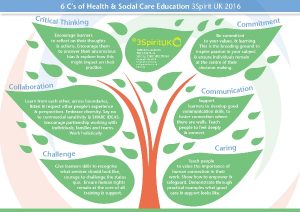 Now that face to face training is not possible, 3 Spirit UK has been forced to re-evaluate the delivery model. The main challenge was how they could effectively deliver training on a subject which is very practical/hands-on in nature, via remote delivery. An interpersonal approach is crucial when teaching ‘care’, and 3 Spirit’s own research shows that training has greater impact where the delivery actively models ‘care’ in a person to person setting, which enables participants to share experiences in a powerfully reflective way.
Now that face to face training is not possible, 3 Spirit UK has been forced to re-evaluate the delivery model. The main challenge was how they could effectively deliver training on a subject which is very practical/hands-on in nature, via remote delivery. An interpersonal approach is crucial when teaching ‘care’, and 3 Spirit’s own research shows that training has greater impact where the delivery actively models ‘care’ in a person to person setting, which enables participants to share experiences in a powerfully reflective way.
The shift in the way learning is delivered therefore threw up many questions:
- How to affect the way learners feel and inspire them to make a difference in their work through a remote setting?
- How to develop rapport with learners and negotiate practical commitments for change?
- How to listen to the way people feel and offer safe spaces where learners can share their experiences?
3 Spirit UK was recently awarded a digital transformation grant by the Ufi VocTech Trust, which provides access to a community of practice to re-imagine their practice. In just a few weeks, they completely transformed their training services for online delivery, and have also been awarded a contract by Skills for Care to deliver the fully funded COVID-19 Essential Training (via webinar), which aims to ensure that the social care workforce are competent, confident and skilled in providing safe care.
Prior to the current crisis, it would have taken years to encourage people to adopt this style of learning and get to the point of delivering this sort of training online. This hasn’t been without its challenges, but 3 Spirit UK remains focused on how technology can be used to enhance facilitative relationships and how it may leverage impact by utilising teaching strategies which encourage reflective practice and collaboration.
Ealing Community Transport
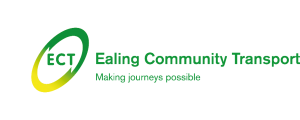 Ealing Community Transport (ECT), which forms part of ECT Charity, provides safe, accessible and affordable community transport to people who are unable to use mainstream transport due to mobility or other difficulties, or because ordinary public transport is unavailable in their area.
Ealing Community Transport (ECT), which forms part of ECT Charity, provides safe, accessible and affordable community transport to people who are unable to use mainstream transport due to mobility or other difficulties, or because ordinary public transport is unavailable in their area.
Through provision of these services, they enable independent living and encourage social interaction for vulnerable people who otherwise would not be able to leave their homes.
During the Covid-19 crisis, the organisation has continued to deliver community transport where it is needed, albeit on a much-reduced scale, and taking all the important precautions: wearing gloves, distancing and wiping down the bus with antibacterial gel before and after each delivery. These services include:
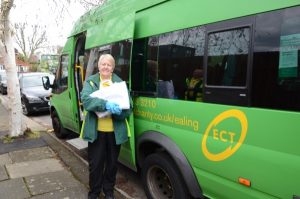 PlusBus door to door services for essential journeys – e.g. shopping trips, school transport for SEN pupils and children of keyworkers
PlusBus door to door services for essential journeys – e.g. shopping trips, school transport for SEN pupils and children of keyworkers- transport to GP surgeries for patients with urgent appointments (non-COVID related)
As the country went into lockdown back in March, ECT also explored other ways they could support the most vulnerable in their local communities. As it emerged that many self-isolating vulnerable people, including those who were shielding, were without vital food supplies, ECT was able to swiftly to repurpose their operations to deliver hundreds of food parcels and meals daily across the borough, on behalf of Ealing Council, Ealing Foodbank and other community and voluntary sector initiatives. The delivery teams are of course taking all appropriate safety precautions and also using the visits as an opportunity to check up on people’s welfare. By mid-May, their teams had delivered nearly 10,000 food parcels.
Ealing Council leaders Julian Bell and Bassam Mahfouz have praised ECT’s delivery crews for playing an important role in getting essential food to thousands of the borough’s most vulnerable people. In a video message, Julian Bell said “you are saving lives”.
Joining the ECT crew on a delivery round, Bassam Mahfouz said “I am amazingly proud to have Ealing Community Transport here in our borough. When it was time to step up, it was they who stepped up to deliver. These food drops can be a difference between life and death. It is an honour to be here to see and help a little.”
ECT has also started a programme of phone calls to their regular minibus passengers who are now isolating at home, to check how they are coping and to provide a bit of company, albeit remotely. Speaking at the start of April as they started to put such measures in place, Chief Executive Anna Whitty said “It is unthinkable to any of us that ECT wouldn’t be there for this group of people who we look after on a day-to-day basis, by supporting the community and partnering with the council at the greatest hour of need.”
Hope Enterprises
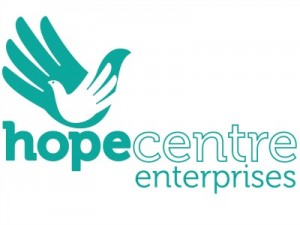 Hope Enterprises CIC is a social enterprise set up by The Northampton Hope Centre, a charity which has been providing help to people in acute need since 1974.
Hope Enterprises CIC is a social enterprise set up by The Northampton Hope Centre, a charity which has been providing help to people in acute need since 1974.
Through a group of trading businesses, Hope Enterprises offers training and work opportunities to people affected by homelessness, drugs, alcohol, poverty, mental health or other disadvantage. All profits are re-invested into the social enterprise or parent charity to support their charitable activities.
The fallout from the Coronavirus outbreak has meant many social enterprises are needing to find new way to get their products to market, and Hope Enterprises is no exception. The lockdown has led to the Hope Tools enterprise and Hope Charity Shop being closed until further notice, which obviously has a big impact on income.
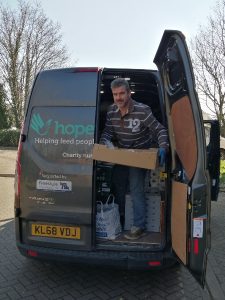 In response, they have adapted their other services to be part of the delivery of essential services and support for those who now find themselves out of work or in continuing poverty during the pandemic. Hope Catering, which is unable to operate normally at this time, has instead been cooking meals for homeless people staying in local hotels/accommodation during the lockdown, using produce supplied by the Hope Gardening project. This has meant that, as well as providing up to 2,000 hot meals a week to some of the most vulnerable in our society, they have managed to keep some of their staff (many of whom are vulnerable themselves) working.
In response, they have adapted their other services to be part of the delivery of essential services and support for those who now find themselves out of work or in continuing poverty during the pandemic. Hope Catering, which is unable to operate normally at this time, has instead been cooking meals for homeless people staying in local hotels/accommodation during the lockdown, using produce supplied by the Hope Gardening project. This has meant that, as well as providing up to 2,000 hot meals a week to some of the most vulnerable in our society, they have managed to keep some of their staff (many of whom are vulnerable themselves) working.
With unemployment rising sharply, Hope Foodclub has stepped up to offer free home delivery of food parcels to vulnerable people in the local community. Over the last few years, the Foodclub, which usually operates as a social supermarket providing discount food to low income families, has built up significant logistical capacity and skills in sourcing food at volume, which has set them up well for responding to the current crisis. In recent weeks, it has tripled its output, and is now supplying over 400 people with essential, healthy food – people who, until recently, were able to buy food without too much worry.
By drawing on the resources of the charity, which has seen in increase in donations and support from individuals and corporate partners, Hope Enterprises is providing a social enterprise response to support local communities in need. Without its expertise, capacity, and existing systems, the local response to the problems created by the virus would have been much weaker.
Integrated Care 24
 Integrated Care 24 (IC24) is a leading healthcare social enterprise providing high quality integrated urgent care to over six million patients across four counties in South East England.
Integrated Care 24 (IC24) is a leading healthcare social enterprise providing high quality integrated urgent care to over six million patients across four counties in South East England.
As an urgent care provider, their teams have been at the frontline of the UK’s response to the coronavirus outbreak. During March, their three NHS 111 services (Norfolk and Waveney, Mid and South Essex and East Kent) experienced a significant and sustained surge in the number of calls from members of the public. To support teams in their contact centres, they introduced ‘social distancing’ measures along with other safety precautions, including the installation of screens into home visiting cars to ensure the team can split themselves between the front and the back of the vehicle.
The Coronavirus outbreak has galvanised the organization to look at new ways of working that had not been used before, such as widespread remote working. Ahead of the lockdown, their IT team was mobilised to start setting up as many staff as possible to be able to work remotely. In a matter of days, over 200 people were set up to work from home, which enabled their various departments to keep running to support their frontline operations.
 IC24 is also piloting homeworking for their NHS111 Health Advisors, which has been a team effort between systems developers, contact centre teams, and clinical teams (to name just a few). To ensure patient safety, there is a facility built in for advisors to escalate cases to clinicians where necessary.
IC24 is also piloting homeworking for their NHS111 Health Advisors, which has been a team effort between systems developers, contact centre teams, and clinical teams (to name just a few). To ensure patient safety, there is a facility built in for advisors to escalate cases to clinicians where necessary.
They also quickly adapted their service delivery model to adapt to the circumstances, whereby clinicians at scale were moved to home working, which meant a reduction in face to face appointments and a switch to telephone consultations to accommodate the change in patient behaviour.
Whilst implementing these changes, IC24 is conscious that the mental health of staff can be impacted by changes to their way of working and the additional pressures faced by health services. They have therefore launched a 12-week ‘Wellbeing Wednesday’ programme to offer additional support to their staff during this uncertain time. This will provide practical support on topics ranging from mental wellbeing, physical health and healthy eating.
The last couple of months have been a unique and challenging time for the organisation, dealing with the obvious demand of significant increases in call volumes, as well as the need to continue to train new recruits, moving delivery of training to a ‘virtual classroom’. The team has really risen to the challenge by pulling together to respond to the challenges imposed by Covid-19.
Real Ideas Organisation
 Real Ideas Organisation is passionate about finding solutions to social problems, creating and supporting real and lasting change for individuals, organisations, communities and places.
Real Ideas Organisation is passionate about finding solutions to social problems, creating and supporting real and lasting change for individuals, organisations, communities and places.
From breathing new life into old buildings, to supporting young people to develop the skills to succeed in an ever-changing world, Real Ideas innovates to deliver real and lasting social change.
Real Ideas manages a number of public buildings, including Devonport Guildhall and Ocean Studios in Plymouth, which have been closed since lockdown came into force back in March. Real Ideas quickly adapted the way it operated, embracing technology to continue its support of vulnerable people and businesses in the south west.
Being based in a large region with notoriously poor transport links and some of the most deprived communities in the country, reaching those who need help has been a challenge. Coronavirus has forced Real Ideas and its partner organisations to move much of their work online, which has largely been a positive step, which will potentially help them reach more people.
However, technology isn’t working for everyone, and Real Ideas has been campaigning hard about digital inclusion in recent weeks/months. It’s estimated about 8% of the UK population doesn’t have workable technology, access to broadband, or a working phone. In some households four or more people could be sharing one mobile phone.
As Real Idea’s Head of Resourcing Steve Clark explains, Real Ideas has been exploring ways to assist those in greatest need: “Wi-Fi is all well and good, but not if you haven’t got access to the kit. We’re working with our IT service provider, ITEC, to try and look at how we can start providing equipment to those that need it.”
It’s not just access to technology and Wi-Fi that acts as a barrier for those in need. Many, particularly older and more vulnerable people, simply can’t use it because it’s too complicated for them. This is another problem that Real Ideas and its partners are trying to solve.
Real Ideas has also been offering free support for families, to help them through this difficult time. This includes providing free ‘Let’s Create’ art packs, support webinars to help parents juggle homeworking with home schooling, and quickly getting Future Make, an existing programme for 7 to 11-year-olds, online. In Future Make, weekly open-ended challenges are set, enabling children and parents to be a designer, a creator and come up with ideas.
Lockdown has also given Real Ideas breathing space to see how its buildings can change and evolve in the ‘new normal’ post-Covid. Instead of approaching it one building at a time, Real Ideas is taking a more holistic approach and thinking of its spaces as a flexible campus, to enable it to do a multitude of different activities in a safe environment.
Digital linkups and screens are planned so presentations, broadcasts and webinars are available across all the sites. Co-working, retail spaces and Enterprise Kitchens could also be used to help start-ups, fledgling and recovering businesses.
As for the future of Real Ideas and how it’ll work – CEO Lindsey Hall believes the values of social enterprises have never been so important: “If this crisis has taught us nothing else, it’s at end of the day we value health, community, family, friends and households. Of course, we want economic stability, but people are clearly saying health and community are things that they really value.”
Watershed
 Watershed is the leading film culture and digital media centre in the South West, which works to advance education, skills, appreciation and understanding of the arts, with a particular focus on film, media and digital technologies. Based in Bristol, but connecting with artists and audiences across the world, Watershed hosts three cinemas, a large café/bar, conference and events spaces, and the Pervasive Media Studio, which brings together a network of over 100 artists, technologists and academics to explore the future of mobile and wireless media.
Watershed is the leading film culture and digital media centre in the South West, which works to advance education, skills, appreciation and understanding of the arts, with a particular focus on film, media and digital technologies. Based in Bristol, but connecting with artists and audiences across the world, Watershed hosts three cinemas, a large café/bar, conference and events spaces, and the Pervasive Media Studio, which brings together a network of over 100 artists, technologists and academics to explore the future of mobile and wireless media.
Watershed took the decision to close their doors to the public in mid-March, just before the national lockdown was announced. This meant an immediate eradication of their trading income, which is generated from ticket sales, their café/bar, and space hire. They have had to furlough many of their staff and whilst the team are thinking ahead to measures they will need to put in place for when they can re-open the building, they have also been busy working with partners to continue to champion and connect independent film, creative technology, artists and audiences and continued to ask for support. This has included:
 Promoting cultural cinema and film industry:
Promoting cultural cinema and film industry:
- Partnering with online platforms to ensure audiences can still access content while the cinema is closed.
- Working with the BFI as the lead organisation of Film Hub South West to launch the BFI FAN COVID-19 Resilience Fund to support companies and individuals working in cinema exhibition
- Launched #shortitout, a collaboration with Depict, Encounters Film Festival, BFI Network and industry, inviting filmmakers to get involved in making short (90 second or less) films
- Supporting the creative cluster:
- Continuing to support the wider creative cluster through the Bristol and Bath Creative R&D project, interviewing and selecting a group of amazing fellows for the Expanded Performance programme
- Redesigned the entire South West Creative Technology Network Data Fellowship programme to take place online
- Pervasive Media Studio:
- The Studio team are supporting the community of over 150 creative residents remotely, helping them navigate the huge range of business support and funds that are emerging across the UK
- Cyber Lunches take place for residents every day and the Lunchtime Talks programme is now fully online every Friday at 1pm
- Continuing the season of artist residencies exploring environmental emergencies
- Working with young people:
- Rife magazine is perfectly placed to embrace online working, with content richer than ever and over 50,000 page views in March and April
- Hosting five trainees as part of the Creative Workforce for the Future Programme, which aims to increase diversity in the creative industries
- Utilising technology to remain connected:
- Launched a digital version of the First Friday monthly networking event using custom built software to create a virtual digital networking platform that pairs participants at random for short conversations. The programme mimics the flow, randomness and engagement of a live networking event and genuinely facilitates conversation. They are now working to stabilize the purpose built digital solution and share the tech.
Speaking about their experience during the last two months, Watershed CEO Clare Reddington said “I am deeply proud of the organisation’s commitment to keeping open what we can, and supporting others where we can, and hope some of that energy has touched our audiences, wherever they are in lockdown.
“Over the next few weeks we will start to share thinking about reopening the building, as it’s clear that the landscape will be changed and we would love to know what our customers want from us.”
Wessex Resolutions CIC
 Wessex Resolutions is a unique lender and Community Interest Company (CIC), working with homeowners to fund home repairs, adaptation and improvements. As a social enterprise, Wessex Resolutions has created a sustainable funding stream in partnership with local councils to improve the quality of homes throughout the UK.
Wessex Resolutions is a unique lender and Community Interest Company (CIC), working with homeowners to fund home repairs, adaptation and improvements. As a social enterprise, Wessex Resolutions has created a sustainable funding stream in partnership with local councils to improve the quality of homes throughout the UK.
Following Government advice, the Wessex Resolutions team has been working remotely since mid-March. They have focused on adapting their processes to ensure they can continue to support their clients with necessary home repairs and adaptations, especially at a time when financial pressures are increased for many people. Looking after their clients’ and colleagues’ wellbeing in this uncertain time is, now more than ever, at the top of their list. In April alone, £184,000 was released to help clients fund home repairs, which is almost double the amount compared to the same time last year.
 They quickly modified their assessment process for new clients, replacing home visits with telephone appointments, and a swift policy change to implement a payment break policy for existing clients who have been financially impacted by the crisis allowed them to immediately reassure their clients.
They quickly modified their assessment process for new clients, replacing home visits with telephone appointments, and a swift policy change to implement a payment break policy for existing clients who have been financially impacted by the crisis allowed them to immediately reassure their clients.
The first day of lockdown coincided with the ‘go live’ of a new loan management system. The team were not deterred by the challenge of this alongside remote working, and taught themselves and each other a vast amount and with great determination, to learn the system whilst still doing their day jobs.
Even before the current crisis, Wessex Resolutions was able to offer clients a range of solutions for anyone experiencing financial hardship, or a change in circumstances. Taking into account individual circumstances, their experienced and qualified loan advisers offer a personalised service, tailored to the specific needs of the client. The initial financial assessment leaves room for unexpected expenses and loan repayments are tailored to the client to meet their specific circumstances, both at the time of the assessment and for the lifetime of the loan.
However, no one can predict the future, particularly in these uncertain times, which means their arrears process is designed to work with clients, not against them. There are a range of options to provide temporary financial relief for clients, including payment holidays, lengthening the loan period to reduce monthly repayments, or even converting the loan to an ‘interest roll-up’ product, which removes the need for monthly repayments altogether.
Where a client experiences severe hardship, particularly due to the Covid-19 crisis, they are also able to temporarily freeze the interest on loan accounts and postpone monthly repayments to take the pressure off until the situation improves. Where a loan account falls into arrears, they treat each case individually and work with clients to find a solution.
For more information, visit www.wessexresolutions.org.uk.
Yateley Industries
 Yateley Industries operates one of the few remaining supported factories that help vulnerable adults to do paid meaningful work and training, intended to help progress them into mainstream employment.
Yateley Industries operates one of the few remaining supported factories that help vulnerable adults to do paid meaningful work and training, intended to help progress them into mainstream employment.
Their aim is to encourage each individual to fulfil their own potential.
They also offer independent living for disabled residents and currently have 40 residents living on site, all of whom have a disability or long-term health condition.
Over the last 3 years, Yateley Industries has been working to build a reserve fund to provide a cushion, should there be any unexpected financial challenges. However, no-one could have predicted the devasting impact the Coronavirus outbreak has had on businesses.
The current situation has led to many challenges for the business, including loss of traditional fundraising income, as well as trading income from the factory and charity shop, together with the ongoing challenge of supporting their vulnerable staff and residents. Many of the staff were furloughed and they were forced to temporarily close the factory, which means they are not able to provide additional face to face support to residents.
The key challenges to residents include isolation, depression and anxiety, and some people just need a friendly and familiar voice at the end of the phone to support them during this time. To ensure residents are protected during this challenging time, they have provided both remote support and some site visits to speak to individuals, which has ensured individuals who live alone do not feel isolated. They have also been able to reinforce the Government Covid-19 guidelines, which can be difficult to understand for some residents.
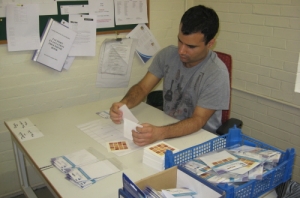 The decision was made to reopen the factory on 1st June, although many staff, who are clinically vulnerable and so are shielding, are not able to return to work. This provided Yateley Industries with the opportunity to test their plans and procedures with a small portion of the workforce. They were lucky to be awarded some grant funding, which has enabled them to put robust PPE and additional safety measures in place to ensure a safe working environment, including:
The decision was made to reopen the factory on 1st June, although many staff, who are clinically vulnerable and so are shielding, are not able to return to work. This provided Yateley Industries with the opportunity to test their plans and procedures with a small portion of the workforce. They were lucky to be awarded some grant funding, which has enabled them to put robust PPE and additional safety measures in place to ensure a safe working environment, including:
- Comprehensive Covid-19 risk assessments for each area of the business
- Reviewed the layout of the factory to ensure staff can sit 2 metres apart
- Screens between desks
- Individual hand sanitisers for each staff member
- Facemasks to be worn, as some staff struggle with the concept of social distancing
- Installed contactless hand sanitiser stations
- Process for staff arrival and departure including temperature and wellbeing checks
- Enhanced cleaning routines
- Home working where possible
To date, Yateley Industries is pleased to say they have had no confirmed cases of Covid-19 amongst their staff and residents.
Speaking about the challenges they have faced as a small organisation, Sam Peplow, CEO of Yateley Industries said “Sharing best practice and speaking to other businesses and Trustees, as well as engagement with staff has really helped. We are all in this together and you should never be afraid to ask for help, advice or ideas. It is an ever-changing landscape and one person alone cannot keep on top of everything you need to do. Learning from mistakes and not being afraid to change plans has also helped.”






